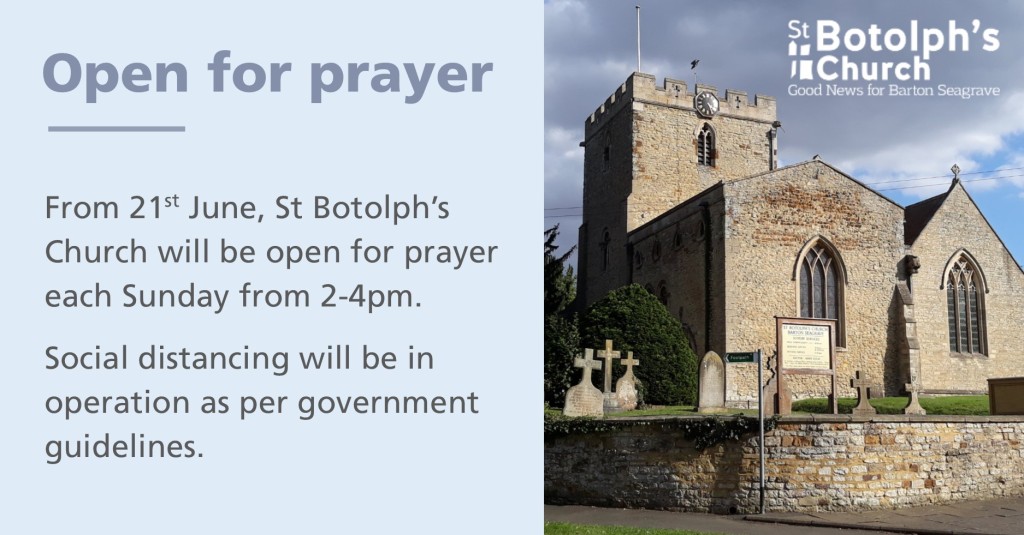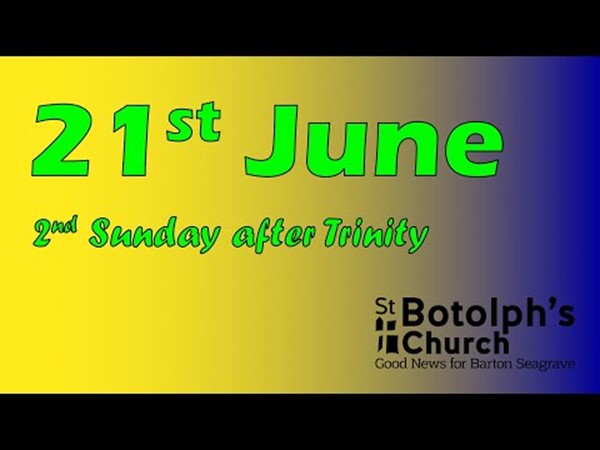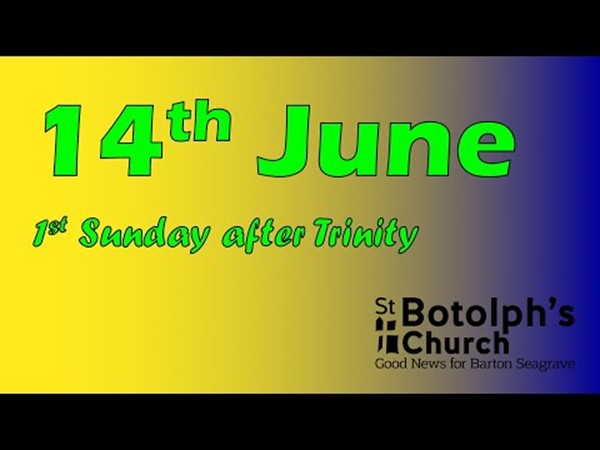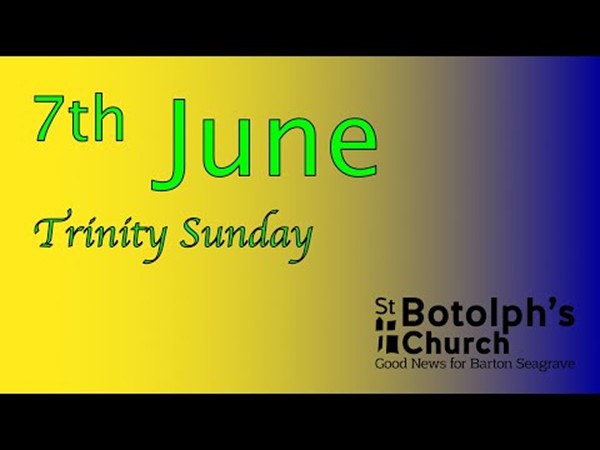Morning Prayer for the third Sunday after Trinity
Month: Jun 2020
The End is Nigh. Maybe?
The last ‘5 o’clock briefing’ occurred last Tuesday, 23rd June. The briefings have been an important part of the government strategy to get through these days of ‘lockdown’. Senior cabinet members flanked by leading scientists have led us through daily statistics. We’ve learned a lot about how to evaluate, handle, interpret (manipulate?), and present statistical data in the process. And we all now know what the magic ‘R’ number represents – who could forget?
All that is now over. We are flying blind.
So what does this mean for us? When can church services resume? When will we be back to normal?
These are great questions. I know that many of us are longing for the day when we can meet together again without fear. When we will no longer need to carry around a small bottle of alcohol hand gel, and when we can shake hands and hug our friends. And, most importantly, when we can attend a service of Holy Communion. I’m afraid the answer is, we don’t know. All we do know is that it will be some time yet before these things are possible.
So, what was Tuesday’s briefing all about? Didn’t it mark the end of lockdown?
Well, we are certainly, it seems, at the beginning of the end of lockdown. However, the process is not straight forward. All we can say for certain is that there is still a long way to go. While COVID-19 infections in the UK have dropped to very low levels, internationally infection rates and mortality are still climbing. This does mean that we can ease the lockdown at home, but international travel and business are still very much affected. The next important thing to note is that, while infection rates are very low, they are not zero. The virus is still with us and it wouldn’t take much to produce a rapid rise in infection and mortality again. This will be the case until either we develop and administer a vaccine, the population develop a ‘herd immunity’, or the virus disappears of its own accord. This last event always seems to happen at some point with pandemics, no one really know how or why. So, we can enjoy a little more freedom, but we must exercise sensible caution.
For St Botolph’s and St Edmund’s, as indeed all churches across the country, this has some serious implications. Whilst we await guidance from the bishops, the main things we know are that there will be no services of Holy Communion for the foreseeable future, meetings must be few in number and social distancing observed, and we are not allowed to sing. So, what can we do? Well, be assured that currently we have no intention of reducing our online offerings and alongside these:
- St Botolph’s church building will be open every Sunday afternoon from 2-4 for private prayer. Hygiene and social distancing measures are in place for this.
- Weddings and funerals are now allowed to take place in the church building. Guest numbers must be small, probably no more than 20, and hygiene and social distancing must be observed.
- We are considering some livestreaming from the church building, perhaps of morning prayer. You may be able to attend these services in person so long as hygiene measures are observed. Please let me know if you think this would be worthwhile.
This is the present situation as at Thursday 25th June. We are still awaiting any guidance from the bishops. We recognise that things are changing almost daily. We will keep you all up to date with changes as they occur.
Please keep in touch via: email, Whatsapp, twitter, messenger, text message, telephone, or letter. There should be something there for most of you!
May God bless you.
Supporting St Bots
Although lockdown is easing somewhat, it is going to be a while before we resume normal public worship.
Since March, finances have been put under considerable strain. Income from Church House room hire has dried up. Being unable to hold “Life event” services, such as weddings, means no fees have been collected. Free will offering by envelope and offertory plate has been badly disrupted.
To try and mitigate this, we have set up Online Giving with “givealittle.co” and “SumUp”. This is a secure and straightforward way to give to St Bots and is backed by Parish Buying, a service provided by the Church of England.
If you would like to give to church then please follow the link below.
If you already give by standing order or direct debit, or are saving up free will offering envelopes, don’t feel you need to use this service also.
Morning Service for 21st June
Private Prayer

Equality, Race and Freedom
There is a lot of racism reported in the new Testament, always condemned I should add. The well known parable of the good Samaritan (Luke 10v30-37) plays on the racism between Jews and Samaritans. The Apostle Peter needed divine education before he would accept that the gospel message was for people other than Jews alone (Acts 10v9ff). The Apostle Paul makes reconciliation between people, in Christ, a central theme of his letter to the Ephesians (chapter 2). In the book of Revelation John has a vision of a great multitude from every nation, tribe, people and language praising Jesus ‘the lamb’ in glory (Revelation 7). And the single verses that sums all this up must be Galatians 3v28, “There is neither Jew nor Greek, there is neither slave nor free, there is no male and female, for you are all one in Christ Jesus.” What matters is what we are in Christ, all else is irrelevant to our status.
So, discrimination on the basis of race is absolutely wrong. As Christians, we must oppose it whenever we meet it, and first in our own hearts. Church leaders must ask, how are we living out Galatians 3v28 as a foretaste of Revelation 7?
So, do you support ‘Black Lives Matter’?
Well … er … yes, of course … that is, I believe the lives of black people matter as much as anyone else’s, so I must. Mustn’t I?
The problem is that if we say we don’t support ‘Black Lives Matter’ as an organisation, then we make ourselves out to be racist (the clue’s in the name), and therefore part of the problem! It’s a very clever name for a campaigning organisation, no one dares oppose them. It’s like setting up a charity and calling it, ‘Cancer needs treatment,’ or ‘end child exploitation’. No sane person could oppose. But is this what it is all about? We need to look further.
First, separating people into ‘black’ and ‘non-black’ is actually impossible. Sure, some people are definitely black, others definitely not. But in between there is a continuum. Genetically the DNA of a white person can frequently be more different from that of another white person than that of a black person. So, biologically, is ‘black lives matter’ a title without meaning? Well, biology is not the whole story. Sociologists distinguish between ‘race’ (ie. Genetics) and ‘ethnicity’ (social group, heritage etc.) In this case the term ‘black’ has nothing to do with the colour of a person’s skin, but their social heritage. Of course, there is a great deal of overlap, but we must not confuse the two. Theoretically a ‘black’ person may have white skin, and vice versa.
Next, we need to investigate what BLM actually stands for, not simply make assumptions that we know from the name. A quick trip to their website should help. Sure enough, we find their history, reports of their campaigns, and some useful resources to publicise their work. But we need to check out the ‘About/What we believe’ section. There is a great deal here that is good. However, some of it is not so promising:
- “We are self-reflexive and do the work required to dismantle cisgender privilege and uplift Black trans folk” There are a number of issues here that can easily be confused, but, for me, I am concerned about the negative attitude towards cisgender (that means male and female in the traditional sense). God made male and female (Genesis 1v27).
- “We disrupt the Western-prescribed nuclear family structure requirement by supporting each other as extended families and “villages” that collectively care for one another, especially our children” If I have read this correctly, it is a statement that categorically opposes marriage and family life as God has given it.
- “We foster a queer‐affirming network. When we gather, we do so with the intention of freeing ourselves from the tight grip of heteronormative thinking, or rather, the belief that all in the world are heterosexual (unless s/he or they disclose otherwise).” Where do I start? Stripping away the jargon, this statement goes way beyond inclusion and valuing all human beings equally (which I would wish to affirm). Rather, it is totally opposed to God’s plan for His world, for male and female relationships, for marriage and family life, and for the preservation of sexual activity for marriage, between husband and wife exclusively.
Next, the group is radically in favour of abortion. Now this may be a hot potato for some, but it does strike me as ironic that an organisation championing rights for the vulnerable denies any rights at all to the most vulnerable, those people not yet born. There is a serious contradiction here.
Finally, the organisation appears to support the use of violent protest. I cannot support this. I believe absolutely in the right to protest a cause. By the grace of God we live in a society that is free, and that is a real blessing. But freedom to protest does not mean freedom to use violence.
So, do I support ‘Black Lives Matter’. Whilst working for equality of all people, I find I cannot align with this organisation for the reasons above. My conscience is my own though, you must decide.




